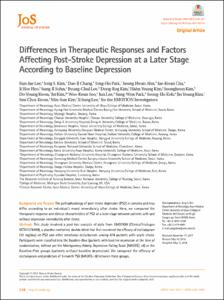Differences in Therapeutic Responses and Factors Affecting Post-Stroke Depression at a Later Stage According to Baseline Depression
- Affiliated Author(s)
- 손성일
- Alternative Author(s)
- Sohn, Sung Il
- Journal Title
- Journal of Stroke
- ISSN
- 2287-6391
- Issued Date
- 2018
- Keyword
- Anger; Depression; Emotional incontinence; Escitalopram; Stroke
- Abstract
- BACKGROUND AND PURPOSE:
The pathophysiology of post-stroke depression (PSD) is complex and may differ according to an individual's mood immediately after stroke. Here, we compared the therapeutic response and clinical characteristics of PSD at a later stage between patients with and without depression immediately after stroke.
METHODS:
This study involved a post hoc analysis of data from EMOTION (ClinicalTrials.gov NCT01278498), a placebo-controlled, double-blind trial that examined the efficacy of escitalopram (10 mg/day) on PSD and other emotional disturbances among 478 patients with acute stroke. Participants were classified into the Baseline-Blue (patients with baseline depression at the time of randomization, defined per the Montgomery-Asberg Depression Rating Scale [MADRS] ≥8) or the Baseline-Pink groups (patients without baseline depression). We compared the efficacy of escitalopram and predictors of 3-month PSD (MADRS ≥8) between these groups.
RESULTS:
There were 203 Baseline-Pink and 275 Baseline-Blue patients. The efficacy of escitalopram in reducing PSD risk was more pronounced in the Baseline-Pink than in the Baseline-Blue group (p for interaction=0.058). Several risk factors differentially affected PSD development based on the presence of baseline depression (p for interaction <0.10). Cognitive dysfunction was an independent predictor of PSD in the Baseline-Blue, but not in the Baseline-Pink group, whereas the non-use of escitalopram and being female were more strongly associated with PSD in the Baseline-Pink group.
CONCLUSIONS:
Responses to escitalopram and predictors of PSD 3 months following stroke differed based on the presence of baseline depression. Our data suggest that PSD pathophysiology is heterogeneous; therefore, different therapeutic strategies may be needed to prevent PSD emergence following stroke.
- Department
- Dept. of Neurology (신경과학)
- Publisher
- School of Medicine (의과대학)
- Citation
- Eun-Jae Lee et al. (2018). Differences in Therapeutic Responses and Factors Affecting Post-Stroke Depression at a Later Stage According to Baseline Depression. Journal of Stroke, 20(2), 258–267. doi: 10.5853/jos.2017.02712
- Type
- Article
- ISSN
- 2287-6391
- Appears in Collections:
- 1. School of Medicine (의과대학) > Dept. of Neurology (신경과학)
- 파일 목록
-
-
Download
 oak-2018-0378.pdf
기타 데이터 / 225.32 kB / Adobe PDF
oak-2018-0378.pdf
기타 데이터 / 225.32 kB / Adobe PDF
-
Items in Repository are protected by copyright, with all rights reserved, unless otherwise indicated.